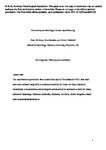Uncertainty and blocking in human causal learning
| dc.contributor.author | Jones, PM | |
| dc.contributor.author | Zaksaite, T | |
| dc.contributor.author | Mitchell, C | |
| dc.date.accessioned | 2018-10-30T14:40:56Z | |
| dc.date.issued | 2019-01 | |
| dc.identifier.issn | 2329-8464 | |
| dc.identifier.issn | 2329-8464 | |
| dc.identifier.uri | http://hdl.handle.net/10026.1/12688 | |
| dc.description.abstract |
The blocking phenomenon is one of the most enduring issues in the study of learning. Numerous explanations have been proposed, which fall into two main categories. An associative analysis states that, following A+/AX+ training, Cue A prevents an associative link from forming between X and the outcome. In contrast, an inferential explanation is that A+/AX+ training does not permit an inference that X causes the outcome. More specifically, the trials on which X is presented (AX+) are often argued to be uninformative with respect to the causal status of X because the outcome would have resulted on AX trials whether X was causal or not. If participants are uncertain about X, their ratings on test might be particularly sensitive to the overall base rate of the outcome. That is, a blocked cue, about which one is uncertain, should be rated as a more likely cause when most cues lead to the outcome than when most cues do not. This hypothesis was supported in 2 experiments. Experiment 1 used an overshadowing control and Experiment 2 used an uncorrelated control (to demonstrate a redundancy effect). Variations in the ratings of the blocked cue as a result of manipulating the outcome base rate can be explained if participants are uncertain about the status of the blocked cue. Experiment 3 showed that participants are uncertain about blocked cues by using a direct self-report measure of certainty. These data are consistent with the inferential account, but are more challenging for the associative analysis. (PsycINFO Database Record (c) 2019 APA, all rights reserved). | |
| dc.format.extent | 111-124 | |
| dc.format.medium | ||
| dc.language | en | |
| dc.language.iso | en | |
| dc.publisher | American Psychological Association | |
| dc.subject | associative learning | |
| dc.subject | blocking | |
| dc.subject | redundancy effect | |
| dc.subject | base rate | |
| dc.subject | uncertainty | |
| dc.title | Uncertainty and blocking in human causal learning | |
| dc.type | journal-article | |
| dc.type | Article | |
| plymouth.author-url | https://www.ncbi.nlm.nih.gov/pubmed/30604999 | |
| plymouth.issue | 1 | |
| plymouth.volume | 45 | |
| plymouth.publication-status | Published online | |
| plymouth.journal | Journal of Experimental Psychology: Animal Learning and Cognition | |
| dc.identifier.doi | 10.1037/xan0000185 | |
| plymouth.organisational-group | /Plymouth | |
| plymouth.organisational-group | /Plymouth/Faculty of Health | |
| plymouth.organisational-group | /Plymouth/Faculty of Health/School of Psychology | |
| plymouth.organisational-group | /Plymouth/REF 2021 Researchers by UoA | |
| plymouth.organisational-group | /Plymouth/REF 2021 Researchers by UoA/UoA04 Psychology, Psychiatry and Neuroscience | |
| plymouth.organisational-group | /Plymouth/REF 2021 Researchers by UoA/UoA04 Psychology, Psychiatry and Neuroscience/UoA04 REF peer reviewers | |
| plymouth.organisational-group | /Plymouth/Research Groups | |
| plymouth.organisational-group | /Plymouth/Research Groups/Centre for Brain, Cognition and Behaviour (CBCB) | |
| plymouth.organisational-group | /Plymouth/Research Groups/Centre for Brain, Cognition and Behaviour (CBCB)/Cognition | |
| plymouth.organisational-group | /Plymouth/Users by role | |
| plymouth.organisational-group | /Plymouth/Users by role/Academics | |
| dc.publisher.place | United States | |
| dcterms.dateAccepted | 2018-09-12 | |
| dc.rights.embargodate | 2019-2-12 | |
| dc.identifier.eissn | 2329-8464 | |
| dc.rights.embargoperiod | Not known | |
| rioxxterms.versionofrecord | 10.1037/xan0000185 | |
| rioxxterms.licenseref.uri | http://www.rioxx.net/licenses/all-rights-reserved | |
| rioxxterms.licenseref.startdate | 2019-01 | |
| rioxxterms.type | Journal Article/Review |


